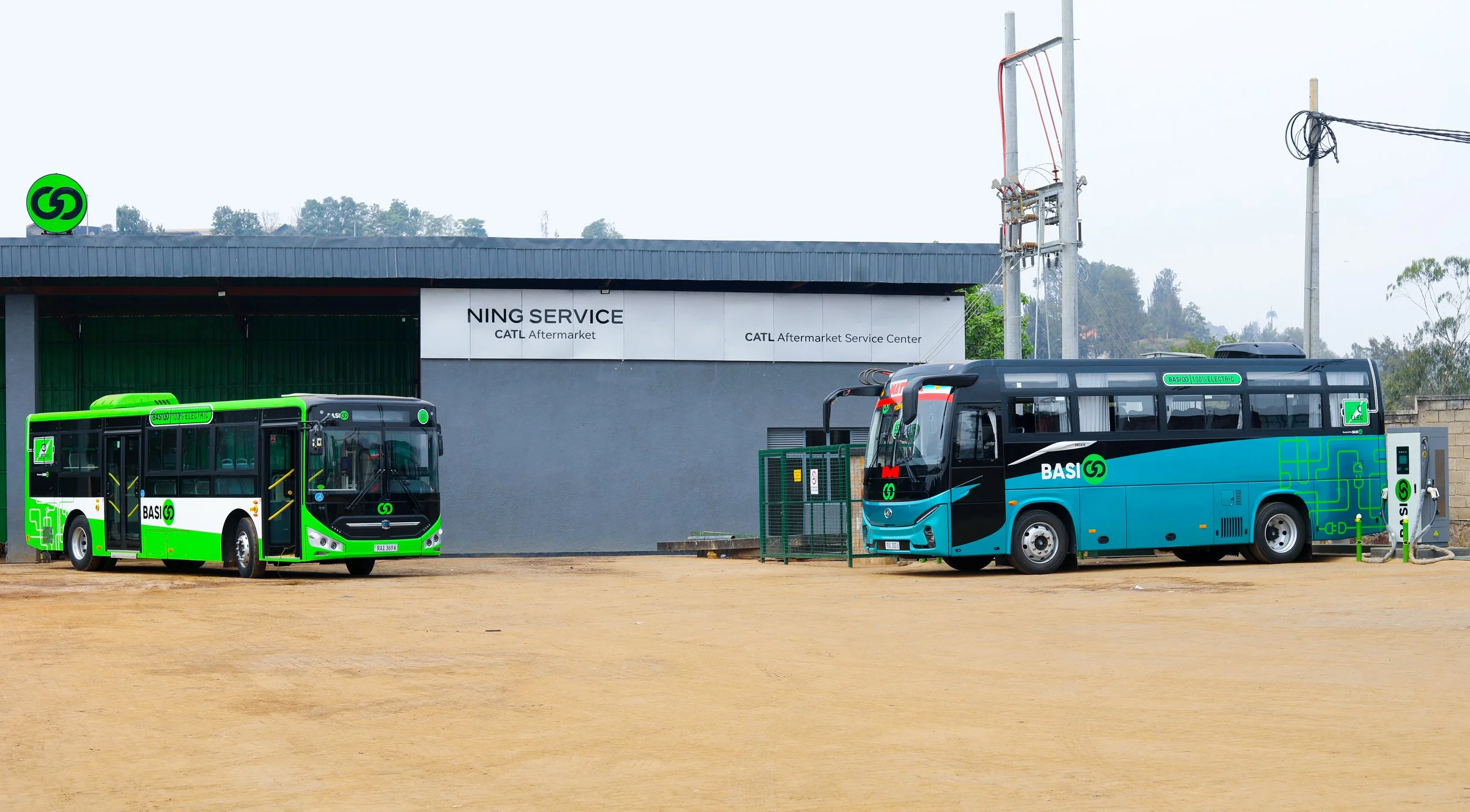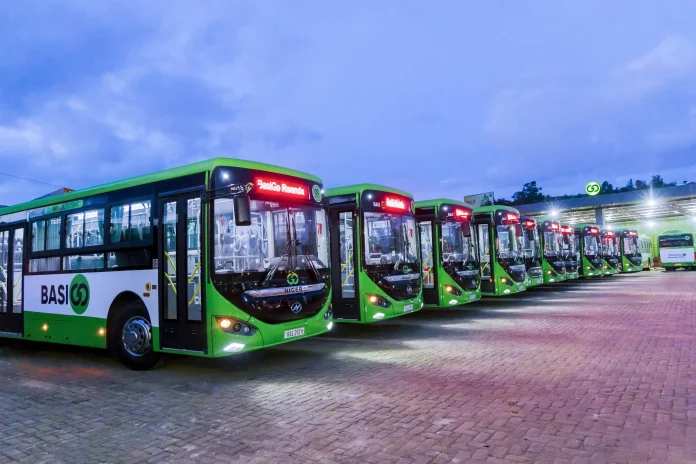France’s Proparco has invested in Nairobi-based BasiGo as the company scales electric buses in Kenya and Rwanda, a move aimed at accelerating the replacement of diesel fleets, expanding charging and assembly capacity, and drawing development finance into Africa’s nascent mass e-mobility market. The deal, confirmed this week, comes as BasiGo seeks to grow from about 100 buses in service to a target of 1,000 vehicles by 2027 and follows a $42 million Series A round last year that helped the company double monthly assembly capacity to 20 buses.
BasiGo’s story now reads like a condensed case study of both the promise and the friction that define Africa’s shift to low-carbon public transport. The company has combined a leasing model with local assembly and charging infrastructure to lower the financial and logistical barriers that have kept many operators tied to diesel.
Read also: Malawi joins Singapore’s growing Article 6 network with new carbon market agreement
Under its Pay-As-You-Drive arrangement, cooperatives and bus owners pay usage fees while BasiGo retains responsibility for charging, maintenance and uptime guarantees. That model converts an economically unrealistic upfront purchase, a new E9 Kubwa electric bus costs around $58,000, into an operating expense operators can manage. The approach has enabled BasiGo to carry more than four million passengers since 2021 and, by the company’s accounting, avoid roughly 1,175 tonnes of greenhouse gases to date.
Development finance institutions are placing big, strategic bets on that model because Africa’s transport transition is primarily an emissions-avoidance opportunity, not only an emissions reduction exercise.

Road transport consumes a large share of national energy in many countries; in Kenya it accounts for over 40 percent of energy use and the country spends about $5 billion a year on fuel imports, a sum equivalent to roughly 15 percent of gross domestic product. Replacing diesel fleets with electric buses therefore cuts local pollution and reduces exposure to volatile oil markets, while also creating demand for new local services and jobs where assembly and depot operations are built.
Proparco’s investment ties BasiGo into the French Development Agency group’s broader focus on low-carbon urban mobility and follows a growing DFI presence in the sector.
BasiGo’s cap table already includes Africa50, which led the $42 million Series A and provided $24 million in equity, as well as debt facilities from British International Investment and the U.S. International Development Finance Corporation totaling about $27.5 million. These instruments illustrate how DFIs are chaining concessional debt and patient equity to the long capital cycles of public transport. For BasiGo, the combination reduces near-term financing strain and helps bridge the gap between pilots and the scale needed to improve unit economics.
Read also: Devki Group breaks ground on Uganda Steel Plant set to transform East Africa’s industrial future
Local assembly is an explicit part of that scale strategy. BasiGo launched Kenya’s first dedicated electric bus assembly line with partners at Kenya Vehicle Manufacturers in 2024 and operates charging infrastructure at its Thika plant, 50 kilometres northeast of Nairobi. In Rwanda it is building the Rwandex depot with about 1 MW of charging capacity, able to charge more than 25 buses overnight. Local assembly reduces freight and import costs, creates jobs, the company expects to generate around 300 production roles, and positions BasiGo to claim policy incentives offered by host governments.
Yet the expansion math is delicate. Electric buses require heavy upfront capital and batteries remain a significant line item in replacement cycles. DFIs have underwritten much of the early-stage risk; BasiGo has raised about $63.1 million since 2021, putting it among the best-funded e-mobility startups in sub-Saharan Africa.
By contrast, competitors and peers operate with smaller war chests: Kenya’s Roam raised $24 million in early 2024, and Nigeria’s MAX secured more than $40 million in institutional debt. These differences matter because negotiating power with suppliers, the ability to underwrite battery replacement funds, and to scale charging networks all hinge on capital depth.
Policy signals across the region remain mixed, and that uncertainty shapes investor risk calculations. Rwanda has become one of Africa’s most favourable environments for electric vehicles through a clear incentive package: free land for charging, discounted electricity for EVs, zero import duties on EVs and parts, and tax breaks that attracted manufacturers. Kenya’s policy picture is more fractured.
Announcements such as a presidential plan to waive taxes on early locally assembled EVs sit alongside legislative proposals that could impose VAT on electric bikes, buses and batteries. Targets such as having at least five percent of newly registered vehicles be electric by 2025 look unlikely to be met; Kenya’s registered EV stock is in the low thousands. Government clarity matters because changes to tax, duty and tariff frameworks can quickly swing the economics of locally assembled buses and planned depot investments.
Read also: TotalEnergies and DelAgua drive 200,000 cookstove rollout across rural Rwanda
On the ground, the selling points for operators are tangible: lower fuel bills, reduced maintenance intervals and quieter vehicles that can raise the quality of urban transport. Public health externalities are also relevant; cities such as Nairobi and Kampala face acute air pollution burdens, and switching heavy diesel fleets to electric drivetrains can cut particulates and NOx emissions immediately. BasiGo’s own data, millions of passengers carried and thousands of tonnes of emissions avoided, helps make the argument to municipal officials and SACCOs that the technology is viable at scale.
Proparco’s entrance signals both confidence and a shifting financing landscape. DFIs are no longer limited to grants and concessional loans; they are deploying structured equity and blended instruments to de-risk private capital entry. For policymakers and municipal transport planners, the urgent question is how to convert pilot deployments into corridor-level replacements while ensuring that incentives, electrical grids and regulatory frameworks do not stall momentum.
BasiGo’s ambition, to reach 1,000 buses by 2027 and expand into more African cities, will become a practical litmus test of whether the continent’s electric bus market can be industrialized with local jobs, resilient charging networks and private capital that is willing to move from demonstration projects to broad deployments.
The combination of DFI finance, local assembly and leasing models gives BasiGo and its peers a path toward scale. The depth of policy support, the ability to lower battery and charging costs through volume, and the discipline of proving unit economics in diverse African urban systems will determine whether that path becomes a highway or a collection of side streets.
Engage with us on LinkedIn: Africa Sustainability Matters







